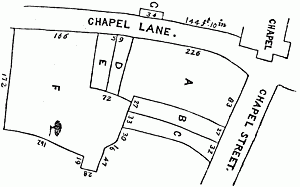The name of William Shakespeare is so powerful in the collective imagination that it’s hard to achieve a neutral stance when considering it. So let us first imagine that all the non-literary documents connected to William Shakespeare belong to a man called John Smith. A historian asked to examine those records and conclude what Smith did for a living, would conclude he was a successful businessman.
 By 4 May 1597 (aged thirty-three), he was rich enough to buy New Place, the second largest house in Stratford-upon-Avon. In January 1598 it was reported that he was looking to buy some tithes ‘in Shottery or thereabouts’. In 1602 he bought 107 acres of land and a cottage in Chapel Lane, which he rented out. In July 1605 he bought one fifth of the Stratford tithes for the sum of £440, which generated £60 a year income.[1] To put these amounts in perspective, a schoolteacher at the time earned around £18 a year. For ten months, from August 1608 to June 1609, he pursued debtor John Addenbrooke, and then his surety Thomas Hornby, through the Stratford courts for the sum of £6. On 10 March 1613, he paid £140 for a share of Blackfriars Gatehouse in London. Whatever else William Shakespeare knew how to do, he knew how to make money.
By 4 May 1597 (aged thirty-three), he was rich enough to buy New Place, the second largest house in Stratford-upon-Avon. In January 1598 it was reported that he was looking to buy some tithes ‘in Shottery or thereabouts’. In 1602 he bought 107 acres of land and a cottage in Chapel Lane, which he rented out. In July 1605 he bought one fifth of the Stratford tithes for the sum of £440, which generated £60 a year income.[1] To put these amounts in perspective, a schoolteacher at the time earned around £18 a year. For ten months, from August 1608 to June 1609, he pursued debtor John Addenbrooke, and then his surety Thomas Hornby, through the Stratford courts for the sum of £6. On 10 March 1613, he paid £140 for a share of Blackfriars Gatehouse in London. Whatever else William Shakespeare knew how to do, he knew how to make money.
[1] £38 net after paying £5 a year to the original leaseholder and £17 to the Stratford corporation
Click Here to Subscribe and we’ll notify you about new content.